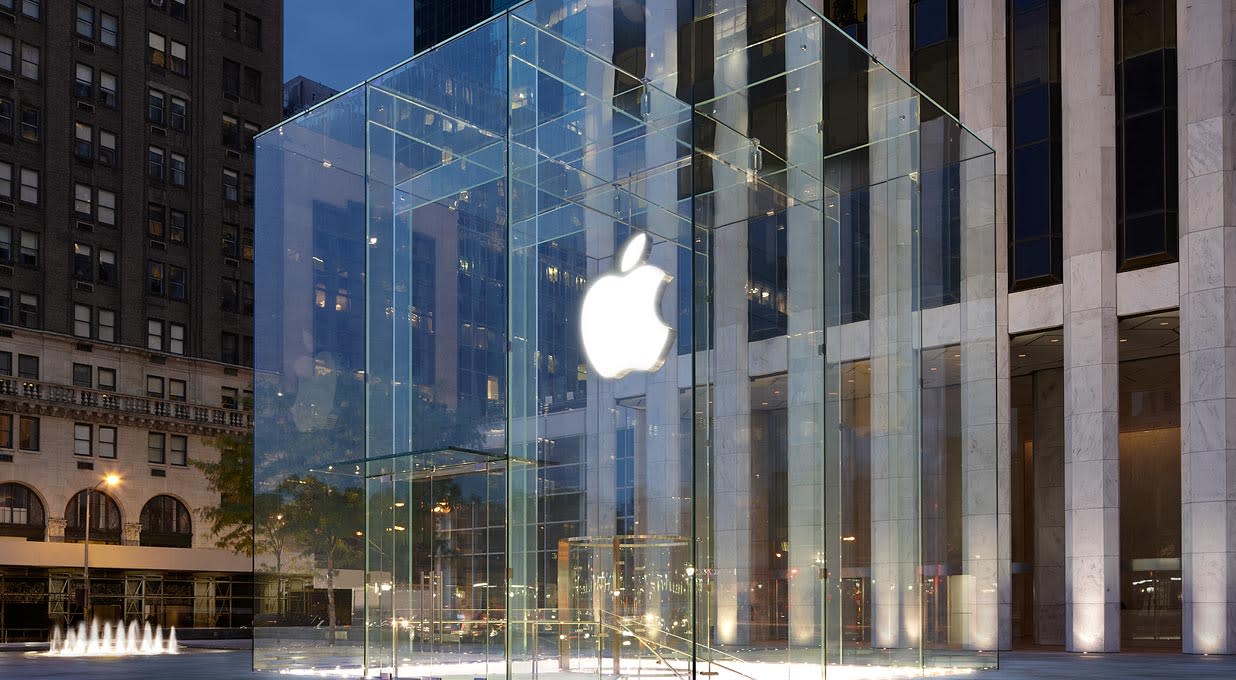Apple’s first-quarter sales rose by 3.9% in the first quarter to a record $124.3bn, just a touch above consensus forecasts. Most of the growth was delivered by an improvement in service revenue, while iPhone sales dipped 0.8% to $69.1bn. On a regional basis, all areas were in positive territory except China where sales dropped 11.1% to $18.5bn.
The shift in revenue mix towards higher-margin services helped operating profit to rise 6.1% to $42.8bn.
Free cash flow fell from $37.5bn to $27.0bn reflecting the adverse timing of certain receipts and payments. Net debt stood at $43.0bn.
Apple declared a dividend of $0.25 per share, while spending on share buybacks in the quarter rose from $20.1bn to $23.6bn.
In the second quarter, revenue is expected to grow in the low to mid-single digits despite a 2.5 percentage point headwind from currency movements.
The shares rose 3% in after-hours trading in early trading.
Our view
Apple continues to earn its reputation as a modern-day consumer staple. First-quarter results were broadly in line with expectations as a strong performance in its services channel helped offset some slight softness in iPhone sales.
The weakness is unsurprising given Apple’s struggled to deliver real innovation in recent times. Gone are the days when each new iPhone was so packed with new features that consumers felt obligated to upgrade every year.
The hope for Apple is that there’s enough substance in the new features to drive a multi-year upgrade cycle. Early data is encouraging and we’re cautiously optimistic this will be the case. But with the rollout of Apple Intelligence still in its infancy, it’s not having a material impact yet.
Partnering with OpenAI brings a large model to Apple products, while the team focused on smaller on-device models to work in tandem. That’s significantly cheaper and keeping as much data as possible on-device helps Apple squash some of the privacy concerns users may have had.
Away from the AI craze, a note of caution stems from competition in China. Another weak drop in revenue marks the ninth quarter of declines in the last eleven. Other big names like Huawei are directly challenging Apple and capturing a portion of local market revenue in the process. Some of these rivals boast larger installed product bases and more attractive prices.
Services growth is likely to remain a key driver of profit moving forward. Services includes things like the App Store and Apple Music. This area of the business is higher margin because adding new users doesn't involve the same costs as building a MacBook or iPhone. But for Services to reach its full potential, it relies on growing hardware sales occurring in the first place.
While there are some extra risks to be considered, Apple's biggest asset remains its brand. The sheer scale of Apple's sales is testament to the grip that the shiny embossed piece of fruit has on global consumers. The loyal customer base means that there's an element of revenue visibility other businesses simply don't have.
Overall, we think Apple remains strong. It wasn’t first past the post in the AI race, but the cautious approach could end up being a shrewd move. While the growth prospects may not be as exciting as other big-tech names, its reliable growth record has earned it a premium rating. This does however come with extra pressure to deliver. Asia remains a tough battleground and there are no guarantees.
Environmental, social and governance (ESG) risk
The technology industry is low-risk in terms of ESG, though some segments like Electronic Components are more exposed to environmental risks. Business ethics tends to be a material risk within the tech sector with everything from anti-competitive practices to intellectual property rights weighing. Historically the sector has flown under the radar when it comes to regulatory oversight, but more recently we’ve seen regulators keen to get involved given the high-profile of some of the “big tech” names. Other key risk drivers include labour relations, data privacy, product governance and resource use.
According to Sustainalytics, Apple’s management of ESG risk is strong.
Apple’s huge scale means its primary ESG risk relates to business ethics. The group’s market dominance exposes it to growing regulatory risks. Of particular note is the growing antitrust concerns relating to the Appstore, where developers must pay 30% in commissions. The exposure to business ethics worries is medium and there is significant work that could be done to manage these risks more effectively. Apple has strong management of Governance risks, including board structure and shareholder rights. According to Sustainalytics, Apple’s overall ESG management is strong.
Apple key facts
All ratios are sourced from Refinitiv, based on previous day’s closing values. Please remember yields are variable and not a reliable indicator of future income. Keep in mind key figures shouldn’t be looked at on their own – it’s important to understand the big picture.
This article is not advice or a recommendation to buy, sell or hold any investment.No view is given on the present or future value or price of any investment, and investors should form their own view on any proposed investment.This article has not been prepared in accordance with legal requirements designed to promote the independence of investment research and is considered a marketing communication.Non - independent research is not subject to FCA rules prohibiting dealing ahead of research, however HL has put controls in place(including dealing restrictions, physical and information barriers) to manage potential conflicts of interest presented by such dealing.Please see our full non - independent research disclosure for more information.


